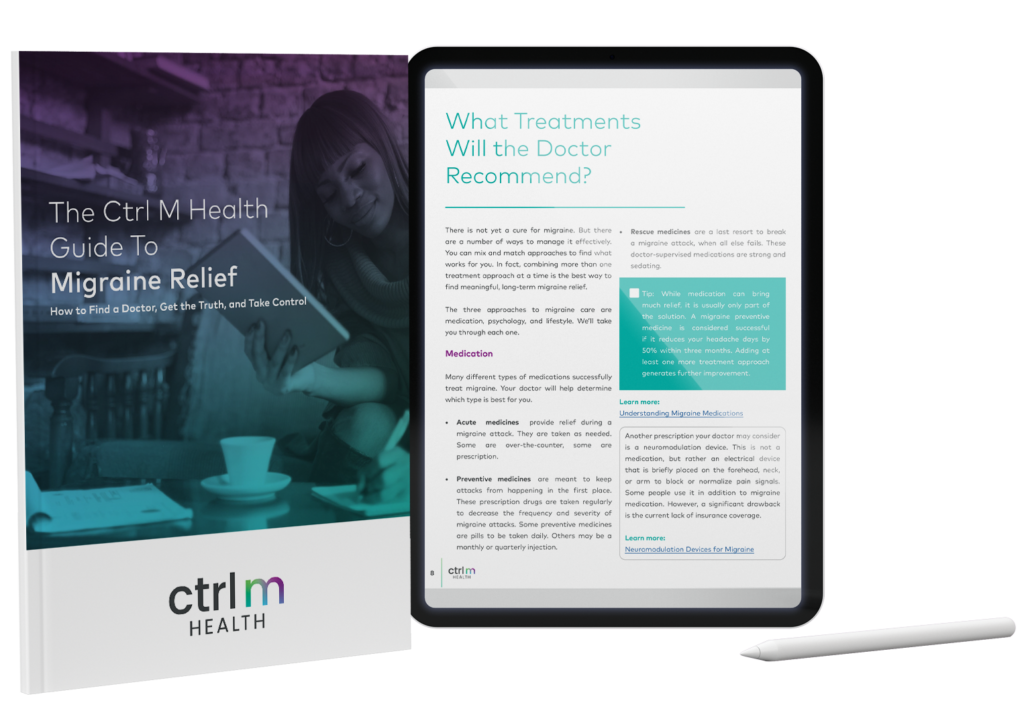When headache or migraine strikes, you probably have a go-to medicine; the pill you swallow each time in the hopes of easing your symptoms and bringing the attack to a quick end. But ask yourself this—is your migraine routine really working for you? The question is important because improper treatment of migraine can actually make your symptoms worse. If you’re not getting the relief you need, it’s time to rethink your strategy on the best medication for migraine—or create a strategy for the first time.
Here’s your primer on over-the-counter versus prescription drugs and how to evaluate whether your current remedy is really the best one for you.
What’s the Best Over-The-Counter Medicine for Migraine Headache?
Over-the-counter medicines are the options we reach for first because they’re non-prescription and widely available. They’re easy to find on the shelves of your local pharmacy and may already live in your medicine cabinet. There are a few types of over-the-counter medications:
- NSAIDs (non-steroidal anti-inflammatory drugs), such as ibuprofen (Advil, Motrin) or naproxen (Aleve) bring relief for many.
- Acetaminophen (Tylenol) is usually less effective than NSAIDs for headache, but easier on the stomach, making it a choice for people with sensitive stomachs or for whom nausea and vomiting are a prime feature of migraine attacks.
- Combination medications such as Excedrin (acetaminophen+aspirin+caffeine) and Anacin (aspirin+caffeine) pull together different ingredients. It’s best to take any medicines with caffeine early in the day because caffeine can disrupt sleep patterns, and sleep is important to migraine prevention.
Control is within reach when you use the right medicines as directed, along with consistent wellness strategies that boost your migraine resilience (sleep, hydration, relaxation, healthy diet, and exercise).
The Care Tuner Guide to Migraine Relief
Untreated migraine tends to worsen over time, so if you suspect you have migraine, it’s important to get help. We’ve compiled everything you need, including what to expect, pitfalls to avoid, and what you can do right now to get relief.

Are Your OTC Medicines REALLY Working For You?
Migraine medication routines can often become an automatic habit we never stop to think about, even if they’re not truly bringing relief. We’re often more focused on day-to-day solutions and simply getting through the week, rather than assessing why there’s so much pain in our lives. Ask yourself these questions about your over-the-counter medication use:
- Are your symptoms relieved or improved with your medication? Your go-to medication should bring relief.
- Are you taking more medicine to get the same results as in the past? You may be at risk of “rebound headache syndrome,” in which the overuse of medication creates a dependency. It’s thought that the brain learns to crave the medicine and gets headaches as a withdrawal symptom. Rebound adds another layer of headaches on top of your already-existing migraine disease and needs to be avoided.
- Tip: If you are taking pain relief medication 10 or more days each month, that’s too much.
- Are you taking many types of pain medicines? Migraine manifests in many types of symptoms besides head pain. If you’re taking a mix of Advil, Tylenol, Aleve, and Motrin to deal with a variety of pains and discomforts, they may actually all be pieces of a bigger migraine puzzle and need to be evaluated together.
- Are your migraine attacks becoming more severe or frequent? These are sure signs that your routine isn’t working and may even be worsening your condition.
If you suspect your over-the-counter medicine isn’t working for you, fear not. There are more effective strategies for dealing with migraine.
Prescription Medicine for Migraine Attacks
 When over-the-counter medicines aren’t working, prescription medicine provides a more powerful tool to reduce the severity and frequency of migraine. Your journey begins with a doctor’s visit, an accurate diagnosis, and a well-constructed treatment plan that includes a medication your doctor feels is right for you.
When over-the-counter medicines aren’t working, prescription medicine provides a more powerful tool to reduce the severity and frequency of migraine. Your journey begins with a doctor’s visit, an accurate diagnosis, and a well-constructed treatment plan that includes a medication your doctor feels is right for you.
- Triptans. Your first-try medication will likely be a triptan, a medication group that controls headaches quickly. With familiar brand name products including Imitrex, Zomig, Maxalt, and Relpax, Triptans came onto the market in 1992 and were hailed as a wonder drug for their strong efficacy. They’re still considered the “gold standard” for acute headache treatment. There are seven types of triptans to choose from, each with differences in efficacy, side effects, and delivery methods (pill, dissolving pill, nasal spray, or injection), all of which influence which is right for you.
If triptans don’t work well for you, other prescription options that stop migraine attacks include:
- CGRP-targeted drugs, a brand-new class of medication that blocks a key neuropeptide involved in migraine attacks;
- Gepants and ditans, brand-new and highly targeted migraine medicines;
- Prescription-strength NSAIDs (non-steroidal anti-inflammatory medications);
- Nausea medications, such as prochlorperazine or compazine, and antiemetics, such as metoclopramide (Reglan), which not only stop migraine, but combat severe nausea and vomiting;
- Dihydroergotamine (DHE), which is effective for migraine but not as targeted as a triptan, potentially creating more side effects.
Remember “rebound headache syndrome?” Well, that can also happen with the overuse of prescription migraine medication, so be sure to use your medicine as directed. If you’re taking too much, it could be a sign that you’d benefit from adding a preventive medicine to your regimen.
Could Preventive Meds Be the Best Medication for Migraine?
If your migraine attacks are frequent, your doctor can prescribe a type of medicine to help prevent attacks from happening in the first place. Migraine prevention meds are often a smart addition to a treatment plan. There are many options to choose from and some can have side effects, so you should discuss the risks and benefits with your healthcare provider.
Bottom line—if over-the-counter medicine works well for you, fantastic. It’s cheaper and easier to procure. But if your go-to meds aren’t resolving your migraine attacks, it’s time to call your doctor and look at your medication treatment plan. Just think, if you had fewer migraine attacks, it would mean more symptom-free days to get on with your life. You’re worth the effort.
Looking for more non-prescription options for your migraine? Learn about the nutritional supplements that can reduce headache in “How Migraine Dietary Supplements Can Support You.”





